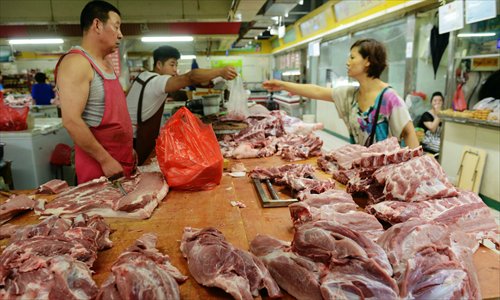Soaring pork prices ease farmers’ burden
Rise could also help boost CPI in H2: experts

A consumer buys pork at a market in Qingdao, East China's Shandong Province. Photo: CFP
Pork prices in China have surged since March due to a shortage of supply and they have now reached the highest level since 2012.
Experts noted that the increase in pork prices will bring benefits to pig farmers, and will also help drive up the consumer price index (CPI) in the second half.
According to data from the Ministry of Commerce, domestic pork prices surged more than 20 percent between March 20 and July 17 this year, Xinhua reported Thursday.
Wang Changxiong, a research fellow at the Agriculture Committee of Shanghai Pudong New Area, told the Global Times on Wednesday that the pork-raising market has been in recession since 2012, and the number of pigs slaughtered decreased dramatically in recent years.
But this caused a supply shortage in 2015, leading to a strong rebound of pork prices recently, Wang said.
At a grocery market in Minhang district in Shanghai, there are around 10 booths that specialize in selling pork.
Gao Qin, one of the booth owners, told the Global Times on Thursday that the price of pork at her booth had increased about 4 yuan ($0.64) per kilogram in the past two months.
The price of live pigs has also surged. Farmers were making a loss per live pig of 41.77 yuan in March, but by April they were making a profit of 47 yuan on average, according to a post on the website of the National Development and Reform Commission on May 8.
Dai Qingzhong, manager of a hoggery in Nanhui county in Shanghai, told the Global Times Wednesday that live pigs only cost about 10 yuan per kilogram in 2014, and for every pig he sold, he made a loss of about 200 yuan on average.
"From 2012 to 2014, I made a loss of about 1 million yuan annually," Dai said.
Dai has run his hoggery for more than 20 years and has always been a partner with a foreign pork supplier.
"Because we are an old hoggery, the supplier allowed us to owe them money in those years of recession, and that's how we managed to endure the trough," he said.
This year, Dai was excited to see live pig prices soar.
"We can make profits at last," he said.
Wo Zengdong, a pig farmer in Wuxi, East China's Jiangsu province, told the Global Times Wednesday that the government has suppressed pork raising in recent years out of environmental protection concerns. This, along with the stagnant market, caused many farmers to stop raising pigs.
The recent surge in pork prices has made Dai worry that the government might take measures to reduce the prices, but Wang said such worries are unnecessary.
"Being an important part of the CPI, the rising pork prices could help drive up the country's CPI data, which has been lingering at a relatively low level in recent years," Wang said. "I don't think pork prices will fall in the second half of 2015."
Food prices account for about one-third of China's CPI, while pork in particular accounts for 2.9 percent of the reading.
The National Bureau of Statistics refused to comment when contacted by the Global Times on Thursday.
The surging pork market has also influenced mainland stock markets, with stocks related to the pork sector rising by more than 60 percent in total from July 9 to July 21, Beijing-based The Mirror newspaper reported on Wednesday.
However, for slaughter enterprises, the rising price of live pigs has increased their costs and hurt profits.
According to a report by the 21st Century Business Herald on July 17, the slaughter industry has had thinner profits in 2015 compared with 2014.
Liu Jintao, a spokesman for Shuanghui International Holdings, one of the largest slaughter and meat processing companies in China, told the Global Times on Wednesday that the company's pork procurement costs have increased in recent months.
But he noted that this has had a limited impact on the company's overall profits, because it has an adequate pork inventory.